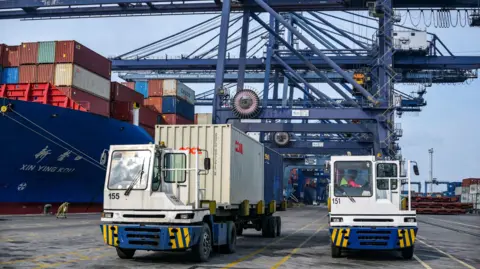Trump claims tariff deal with Indonesia
 AFP/Getty
AFP/GettyUS President Donald Trump said he has settled on another tariff deal - this time with Indonesia.
Trump said he had agreed to lower tariffs he had threatened on goods entering the US from Indonesia to 19%, in exchange for what he called "full access" for American firms.
Terms of the deal were not immediately confirmed by the southeast Asian country, which boasts a small but growing trade relationship with the US. A senior Indonesian government official said on Wednesday that a statement would be published soon, Reuters reported.
The pact is the latest to emerge after the White House unveiled a barrage of tariffs this spring, kicking off a flurry of trade talks over the duties.
After suspending his most aggressive tariff plans from earlier this year, Trump this month renewed his threats, sending warning letters to dozens of countries that he intended to start charging high tariffs from 1 August.
His targets included all of America's biggest trade partners, including the European Union, Canada, Mexico, Japan and South Korea.
Indonesia also received a letter from Trump last week outlining plans for a 32% tariff on its goods, reportedly bewildering officials who had thought an agreement was close.
Trump said on Tuesday he had reduced that rate after a phone call with the president of Indonesia.
He said as part of the deal, Indonesia had agreed to lower its trade tariffs for products from the US, which America has complained were high for many agricultural products as well as certain manufactured goods.
"They are going to pay 19% and we are going to pay nothing... we will have full access into Indonesia," he said.
The country has also agreed to purchase $15bn (£11.2bn) worth in US energy, $4.5bn in American agricultural products and 50 Boeing jets, he later wrote on social media.
Those figures are lower than those outlined in a trade deal Reuters had reported earlier this month was expected to be signed.
Indonesia ranks as one of America's top 25 trade partners, sending about $28bn to the US last year, including clothing, footwear and palm oil.
Stephen Marks, economics professor at Pomona College in California, said the benefits of the deal to Indonesia "are more political than economic".
"Certainly, [the US does] have some major imports categories from Indonesia - electronics, apparel, footwear, palm oil products which are used in cosmetics," he said.
"Relative to total trade, the US is a significant importer from Indonesia, though not as great as some of its Asian trading partners."
As well as Indonesia, the administration has announced agreements with just the UK, China and Vietnam. In all three of those cases, the deals left high US tariffs in place while key issues and terms went unconfirmed or unresolved.
Everett Eissenstat, a partner at Squire Patton Boggs whose served as an economic adviser during the first Trump administration, said he expected the White House to unveil more deals in the coming weeks, while noting that many countries appeared to have lowered their expectations of what they hope to achieve.
He pointed to recent comments on Tuesday by Canadian Prime Minister Mark Carney, which raised the possibility that the country might accept tariffs at levels once considered unthinkable.
"The tone is changing a lot," he said, adding that he thought a deal was better than no deal.
"For governments, I think it's best to be at the negotiating table rather than to walk away," he added.
